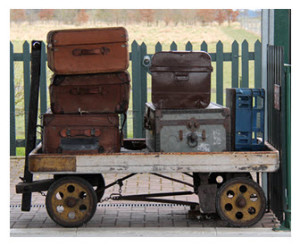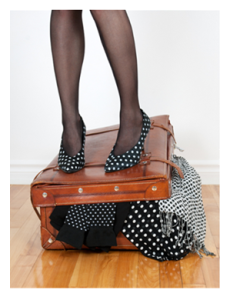“You can’t carry that guilt,” an old friend says. “Those are his issues, not yours.”
 “But I caused him pain,” I say, about another friend. “And I had no idea.”
“But I caused him pain,” I say, about another friend. “And I had no idea.”
“You have your own stuff to deal with,” she remarks. “That’s enough.”
“What do you mean?” I ask.
“Don’t allow empathy to blur boundaries. And don’t carry other people’s baggage.”
I let that sit. I’m absorbing.
“But I let him down,” I say. “And I feel terrible about that.”
Misplaced guilt becomes a bad habit.
The Notion of Baggage
Baggage?
It’s a well-established notion with broad interpretation — a sweeping term that includes people, obligations, memories and emotions. We haul this unlikable load from person to person and place to place, encumbered by its presumably disagreeable mix of unresolved issues, resentments, fears and insecurities.
Metaphorically speaking, baggage grows heavier with dysfunctional relationships and unwanted outcomes. No carry-on could possibly contain the disillusionment of fizzled romances, the bitterness of broken marriages, the drain of interaction with nasty exes, or the deep disappointment of failed ventures.
“Not too much baggage” is frequently referenced in the online dating world among the divorced set. Translation: Whatever the marital fall-out, package up your life as uncomplicated.
To which I say: Good luck with that!
Lighten the Load
Sure, we can and should look long and hard at the troubling burdens we drag along — mistakes we learned from (can we let go of the guilt?), people we hurt (when young and clueless), opportunities we walked away from (and later regret). But must we bear these burdens for life?
Thought Catalog offers this perspective on our emotional baggage:
… if we want to be free of our baggage we have to actually know what it is we’re carrying and learn to accept it.
Easier said than done, right? So just how do we identify, confrtont, accept and move on, presumably lighter?
Thought Catalog continues:
… there comes a point in life when we’ve had enough pretending and we need to get down and dirty and do an intensive shakedown of the luggage we carry with us every day. We need to go through every little morsel of our lives that cause anxiety or that we can’t seem to get past and say, is this essential for survival?
Quite right, don’t you think? At the very least it’s a sensible premise if we view baggage as too unwieldy to bear. However, in the examination of each item we’re carrying, couldn’t we try to strip the objects of their onerous poundage while still retaining their value? For example, if my baggage includes difficult memories, can I keep the lessons and discard the pain?
Not My Baggage?
One of my ex-husband’s go-to phrases was this: “It’s not my problem.”
I heard those words throughout our marriage, and so I learned to make do with the resulting impacts, which often entailed taking on too much, and on my own.
 My approach was this: When a family member is in trouble, when a friend is in trouble, when a stranger is in trouble — I do whatever I can, and can’t imagine behaving otherwise. This is natural to me. It is how I was raised. It is how many of the women I know were raised. And while it may sound judgmental (or naive), I’m often dismayed when others don’t respond in a similar way.
My approach was this: When a family member is in trouble, when a friend is in trouble, when a stranger is in trouble — I do whatever I can, and can’t imagine behaving otherwise. This is natural to me. It is how I was raised. It is how many of the women I know were raised. And while it may sound judgmental (or naive), I’m often dismayed when others don’t respond in a similar way.
At times, I’ve put myself at risk to jump in and assist, and I’ve paid the price in worry, in lost sleep, and in taking on baggage — emotional baggage — that isn’t mine.
But it could be mine. Misfortune can hit any one of us.
And if I cause someone harm, even unintentionally?
I feel dreadful. I want to make amends. But I have difficulty separating my wish to ease their pain from my actual role in causing it. They may be suffering for reasons that have nothing to do with me, which is precisely the point my friend was making.
My marriage?
Baggage handling, or helping in general, is only one way in which my spouse and I lived conflicting philosophies. But if his beliefs set him at one end of the self-interest spectrum, surely mine placed me at the opposite end. Perhaps neither is viable long-term.
Technology Doesn’t Replace Being There
At least a decade has passed since the days of sitting across from a friend who pours out her troubles and her joys, or with whom I might do the same.
Instead, we interact remotely. Geographic distance has become the norm. Technology is the means by which we connect. And thank goodness we have it! However, communicating through an assortment of devices and screens can also be inadequate for expressing our feelings and offering our empathy — especially if we’re hurried or multitasking. We may unwittingly short-change, if not distort, well-intentioned messages, both sending and receiving.
We text a lover playfully, and the tone is received as angry; we email a friend when we’re in a rush, and words fail to convey concern.
Communication is tough enough in person! Without a smile, a gesture, or a voice, aren’t we sometimes woefully misunderstood? Minor irritations are intensified. Disagreements are aggravated. Old wounds are opened. Games people play — mind games — are helped along. And not necessarily to anyone’s advantage.
FaceTime? Sure, it’s useful. But there’s nothing like being in the same physical space with the person we love who simply needs a hug, a touch on the arm, a tender kiss. At times, these are the most eloquent tools we possess.
How We Help Each Other
Giving. I’m a believer. Life is richer, happier, more meaningful when we give. I feel useful when I’m giving. I feel more myself when my efforts contribute to something beyond “me.”
 In giving, in helping, in empathizing, the dangers (for some of us) of carrying other people’s baggage can be a problem.
In giving, in helping, in empathizing, the dangers (for some of us) of carrying other people’s baggage can be a problem.
As I process the conversation that instructs me to put down the baggage that isn’t mine, I’m picturing European train stations, films from the 40s and 50s, platforms and porters and trolleys on which bags can be stacked, then wheeled to a car for transport.
In the past, we weren’t expected to put everything in the proverbial “carry-on,” as we strain to fit all the messy joys and sorrows of our past into one small bag to be placed overhead or tucked beneath a seat. There were people and systems designed to assist, able to accommodate our trunks and cases and satchels.
Those people and systems, for many of us, no longer exist.
Yours, Mine and Ours
It seems to me that too many of us are left to fend for ourselves. We’re alone with our baggage, and unable to lighten it much less to move forward. That baggage, incidentally, invariably grows heavier with time, not to mention with our scattered families, cobbled together careers, precipitous relationships, and commodity dating via hand-held devices.
Whether we carry our difficult memories, emotions, and responsibilities by choice or by circumstance, it helps if we can distinguish who “owns” what — a determination that shouldn’t prevent us from stepping in and lending a hand.
If we can offer services as porters, shouldn’t we try? If we can locate trolleys, shouldn’t we point them out? And no doubt the take-away in the conversation with my friend: Shouldn’t we recognize when we’re already carrying too much?
If we topple, we help no one.
You May Also Enjoy
Great analogy, thank you. I’m carrying far too much at the moment. I know I’m not alone in that, but I FEEL alone. Perhaps that’s because my baggage is similar to but not the same as others’. I guess each of us carries our own and the struggle is learning how to restrict the weight.
It is a struggle, Katherine. Finding that manageable weight. I think you’re so right. If only we could help each other lighten the load, especially when we’re feeling alone. xo